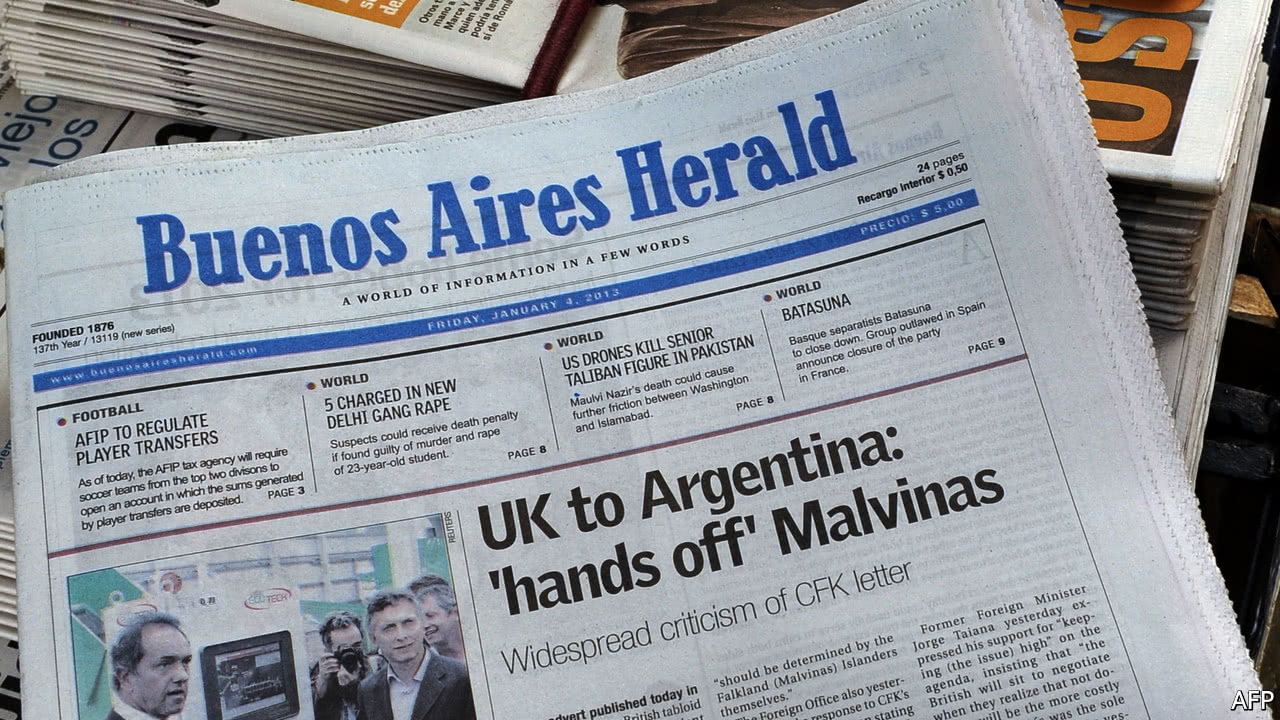Why English-language newspapers in Latin America are struggling
The Buenos Aires Herald, a brave newspaper, publishes its last edition
THE Buenos Aires Herald had a reputation for fearlessness. During Argentina’s “dirty war” in the 1970s it was the only newspaper that denounced the disappearances of thousands of Argentines under the military regime. The editor, Robert Cox, and news editor, Andrew Graham-Yooll, went into exile. Mr Graham-Yooll wrote “A State of Fear”, a harrowing account of the descent into dictatorship. But the Herald, the capital’s English-language newspaper, could not survive technological progress. On July 31st the 141-year-old paper said it would close.
William Cathcart, a Scot, founded the Buenos Ayres Herald for Britons drawn to Argentina to work on the country’s expanding railways. Its first edition was a single sheet, with advertising on the front and shipping news on the back. As its coverage expanded, it sometimes scooped richer Spanish-language rivals.
It had counterparts across Latin America. Argentina’s first English-language paper was the Buenos Ayres Standard, started by two Irish brothers in 1861; it stopped publishing 98 years later. The Daily Journal, founded by an American, served readers in Caracas from 1945 until 2008. The Peruvian Times, launched in 1908, survives in digital form. The News in Mexico City, established in 1950, still has a paper edition.
The English papers were sometimes outspoken when the Spanish-language press was censored, perhaps partly because their writers could easily take refuge in their home countries. Many British and American journalists who went on to cover the region as foreign correspondents got their start at the local English papers.
As the number of Anglophone immigrants fell, tourists and expats became the papers’ main readers. English-medium news became less necessary for visitors when the internet let them browse their hometown papers from abroad.
The Herald changed owners several times in the 2000s before ending up in 2014 as part of Grupo Indalo, whose owners are close to Cristina Fernández de Kirchner, Argentina’s populist president until 2015. Government advertising (and dedicated journalists) kept the paper alive; its editorial line became more left-wing, but not slavishly supportive of Ms Fernández. But the government of her centre-right successor, Mauricio Macri, hit Grupo Indalo with a tax demand for 10bn pesos ($570m). With estimated monthly losses of 2m pesos, the Herald briefly became a weekly before saying it would close.
The Herald and its kind are being replaced by publications run by nimbler entrepreneurs, providing information on local events mainly to tourists and expats. In Bogotá, Colombia’s capital, two English-language newspapers have been founded in the past decade. The Bubble, a website based in Buenos Aires, has plans to expand to Brazil and Mexico. Today’s Cathcarts are bullish. But few expect their publications to last 141 years.
William Cathcart, a Scot, founded the Buenos Ayres Herald for Britons drawn to Argentina to work on the country’s expanding railways. Its first edition was a single sheet, with advertising on the front and shipping news on the back. As its coverage expanded, it sometimes scooped richer Spanish-language rivals.
Latest updates
The English papers were sometimes outspoken when the Spanish-language press was censored, perhaps partly because their writers could easily take refuge in their home countries. Many British and American journalists who went on to cover the region as foreign correspondents got their start at the local English papers.
As the number of Anglophone immigrants fell, tourists and expats became the papers’ main readers. English-medium news became less necessary for visitors when the internet let them browse their hometown papers from abroad.
The Herald changed owners several times in the 2000s before ending up in 2014 as part of Grupo Indalo, whose owners are close to Cristina Fernández de Kirchner, Argentina’s populist president until 2015. Government advertising (and dedicated journalists) kept the paper alive; its editorial line became more left-wing, but not slavishly supportive of Ms Fernández. But the government of her centre-right successor, Mauricio Macri, hit Grupo Indalo with a tax demand for 10bn pesos ($570m). With estimated monthly losses of 2m pesos, the Herald briefly became a weekly before saying it would close.
The Herald and its kind are being replaced by publications run by nimbler entrepreneurs, providing information on local events mainly to tourists and expats. In Bogotá, Colombia’s capital, two English-language newspapers have been founded in the past decade. The Bubble, a website based in Buenos Aires, has plans to expand to Brazil and Mexico. Today’s Cathcarts are bullish. But few expect their publications to last 141 years.

No comments:
Post a Comment